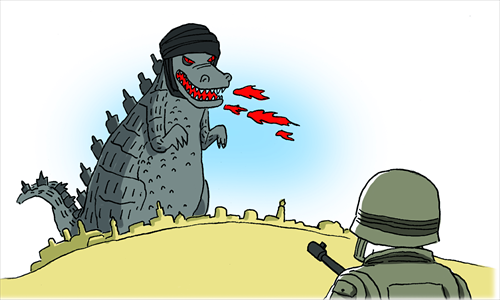

 |
| Illustration: Liu Rui/GT |
It was reported that over 300 Chinese nationals have recently traveled through Southeast Asian countries to join the Islamic State (IS) terrorist group. While no evidence was provided to support these numbers, the phenomenon is not that surprising as China has a substantial Muslim population of around 20 million and the global trend of Sunni Muslims being drawn to fight in Syria and Iraq, the most attractive battle field on the jihad's map.
However, in much the same way that China is impacted by the appeal of the conflict in Syria and Iraq, China might also face the possible blowback that many countries are worried about.
There are therefore some lessons likely to be drawn from other nations' experiences in terms of strengthening border defense, improving intelligence sharing and focusing on trying to understand why it is that young Chinese Muslims are drawn to fight in foreign battlefields.
In fact, the problem of foreign fighters for China is likely less compared to that currently faced by the West. IS and the other groups in Syria and Iraq have done little to visibly target or deploy assets to attack China beyond some rhetorical messages in their publications.
And it is not clear from available public information that anyone has made the journey to Syria and Iraq and then back to China.
The problem for China is more about instability and problems that IS has caused not only in Iraq and Syria but in the broader region and globally.
China is a growing power with footprints and nationals everywhere. China has substantial oil investment, for example, in Iraq. If there is instability and violence, then it will have a negative impact on China's interests in this part of the world, as well as further afield.
IS-like groups developing in North Africa have a potential impact to Chinese investments there. As China becomes bigger and grows a more global footprint, it will find itself increasingly caught up in such terrorist groups' violence and the repercussions.
In the global context, the success and attention of IS has led to a new kind of extremist revivalism among Sunni radicals around the world. The declaration of the IS has drawn a lot of people in and shown how this group has been able to demonstrate success and thumb its nose at the international community.
To some extent, there has been a general underestimation of the attraction of the concept of IS. There is a general excitement among some in the Sunni world about IS' narratives of building a Caliphate, and their messages have proven much more powerful than could have been predicted.
In response to the group's narratives, we have not only seen people go to the Levant, but we have also seen individuals launching attacks in France, Belgium and Denmark, as well as aspirational attacks in a number of other locations. And none of this takes into account the instability that groups associated or claiming affiliation with IS are causing in North Africa, and possibly now in West Africa as well.
This is quite a turn of events. If we take a historical perspective, it is possible to find that a narrative used to exist that thought the Arab Spring would lead to the end of Al Qaeda, because civilian populations were overthrowing governments by using peaceful protest, thus rendering Al Qaeda's violent approach redundant.
However, the lesson learnt is that in fact all this has done is to create instabilities in other places. And into that instability, Al Qaeda-like groups have grown, and IS has now emerged seeming to try to supplant Al Qaeda. This is a common threat, and China should play a greater role in trying to counter it.
 J-11 fighters in air exercise
J-11 fighters in air exercise Beauties dancing on the rings
Beauties dancing on the rings Attendants-to-be join Mr. & Miss Campus Contest
Attendants-to-be join Mr. & Miss Campus Contest Beijing's toughest anti-smoking law takes effect
Beijing's toughest anti-smoking law takes effect Family lives in cave for about 50 years in SW China
Family lives in cave for about 50 years in SW China PLA soldiers operating vehicle-mounted guns in drill
PLA soldiers operating vehicle-mounted guns in drill Blind carpenter in E China's Jiangxi
Blind carpenter in E China's Jiangxi China hosts overseas disaster relief exercise for the first time
China hosts overseas disaster relief exercise for the first time 20 pairs of twins who will become flight attendants in Sichuan
20 pairs of twins who will become flight attendants in Sichuan Obama is sowing discontent in S.China Sea
Obama is sowing discontent in S.China Sea Rescuers work through night to reach cruise ship survivors
Rescuers work through night to reach cruise ship survivors Driving through limbo
Driving through limbo Facing down MERS
Facing down MERSDay|Week